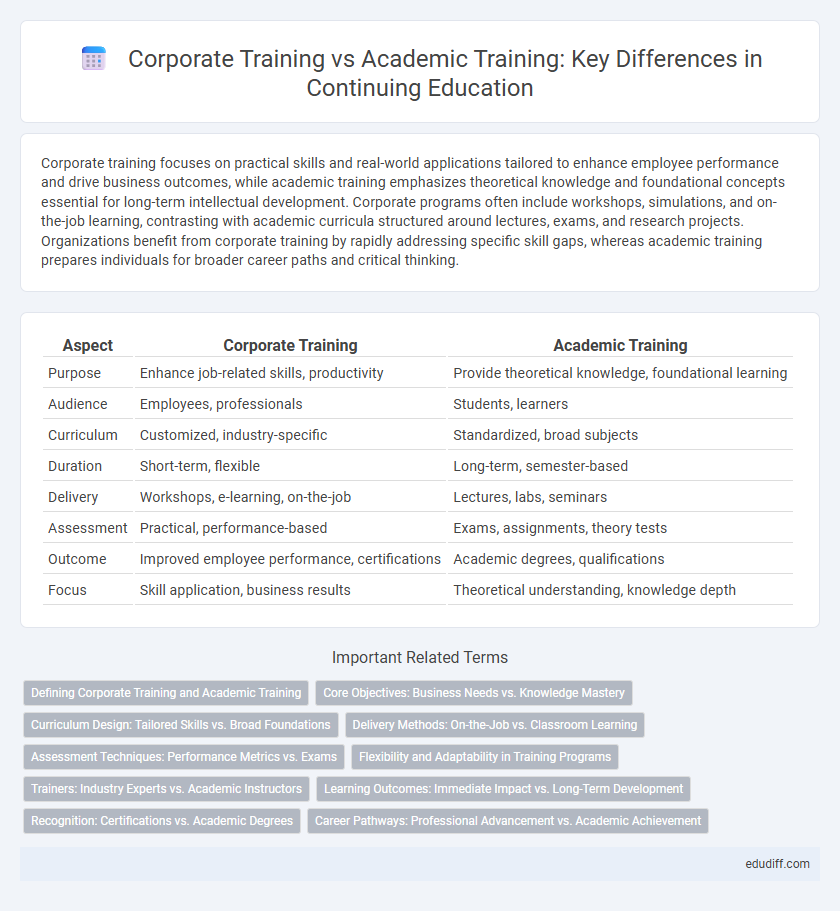Corporate training focuses on practical skills and real-world applications tailored to enhance employee performance and drive business outcomes, while academic training emphasizes theoretical knowledge and foundational concepts essential for long-term intellectual development. Corporate programs often include workshops, simulations, and on-the-job learning, contrasting with academic curricula structured around lectures, exams, and research projects. Organizations benefit from corporate training by rapidly addressing specific skill gaps, whereas academic training prepares individuals for broader career paths and critical thinking.
Table of Comparison
| Aspect | Corporate Training | Academic Training |
|---|---|---|
| Purpose | Enhance job-related skills, productivity | Provide theoretical knowledge, foundational learning |
| Audience | Employees, professionals | Students, learners |
| Curriculum | Customized, industry-specific | Standardized, broad subjects |
| Duration | Short-term, flexible | Long-term, semester-based |
| Delivery | Workshops, e-learning, on-the-job | Lectures, labs, seminars |
| Assessment | Practical, performance-based | Exams, assignments, theory tests |
| Outcome | Improved employee performance, certifications | Academic degrees, qualifications |
| Focus | Skill application, business results | Theoretical understanding, knowledge depth |
Defining Corporate Training and Academic Training
Corporate training centers on enhancing employees' skills aligned with organizational goals, often tailored to specific industry needs and job roles. Academic training emphasizes foundational knowledge and theoretical understanding, typically delivered in formal educational settings like universities and colleges. Both approaches serve distinct purposes, with corporate training focusing on practical application and academic training on comprehensive subject mastery.
Core Objectives: Business Needs vs. Knowledge Mastery
Corporate training prioritizes addressing specific business needs by developing skills that enhance employee performance and drive organizational goals, ensuring immediate applicability and measurable outcomes. Academic training focuses on deep knowledge mastery and theoretical understanding, fostering critical thinking and long-term intellectual growth beyond practical job functions. The core objective in corporate settings is optimizing workforce productivity aligned with business strategies, whereas academic institutions aim at comprehensive education and expertise development.
Curriculum Design: Tailored Skills vs. Broad Foundations
Corporate training emphasizes curriculum design tailored to specific job skills and immediate workplace applications, ensuring employees acquire competencies that directly enhance performance. Academic training focuses on broad foundational knowledge across disciplines, fostering critical thinking and theoretical understanding for diverse career paths. Customization in corporate programs drives practical expertise, while academic curricula prioritize comprehensive education frameworks.
Delivery Methods: On-the-Job vs. Classroom Learning
Corporate training primarily emphasizes on-the-job delivery methods, enabling employees to acquire practical, role-specific skills through real-time experience and immediate application. Academic training relies predominantly on classroom learning, promoting theoretical knowledge and structured curriculum in a controlled environment. On-the-job training fosters adaptability and continuous improvement, while classroom learning supports foundational understanding and standardized instruction.
Assessment Techniques: Performance Metrics vs. Exams
Corporate training relies on performance metrics to evaluate employees' real-time application of skills through practical tasks and project outcomes, enabling tailored feedback and continuous improvement. In contrast, academic training primarily uses exams to assess theoretical knowledge and candidate comprehension under standardized conditions, focusing on individual achievement. The emphasis on performance metrics in corporate settings aligns with business objectives and competency development, while exams serve as benchmarks for academic proficiency and mastery.
Flexibility and Adaptability in Training Programs
Corporate training programs emphasize flexibility by tailoring content to evolving industry needs and employee skill gaps, enabling organizations to respond swiftly to market changes. Academic training typically follows a fixed curriculum with less frequent updates, limiting adaptability to real-time business challenges. Customized corporate learning paths and modular course designs enhance adaptability, ensuring continuous alignment with organizational goals.
Trainers: Industry Experts vs. Academic Instructors
Corporate training typically employs industry experts who bring practical, real-world experience and insights directly applicable to current business challenges. Academic training relies on instructors with theoretical knowledge and research backgrounds, emphasizing foundational principles and long-term learning. The expertise of corporate trainers often accelerates skill acquisition aligned with market needs, while academic instructors provide a broader educational framework fostering critical thinking and analysis.
Learning Outcomes: Immediate Impact vs. Long-Term Development
Corporate training emphasizes immediate impact by equipping employees with practical skills that enhance job performance and address current organizational needs. Academic training focuses on long-term development, fostering critical thinking, foundational knowledge, and adaptability for future challenges. The difference in learning outcomes stems from corporate training's application-driven approach versus academic training's emphasis on theoretical understanding and intellectual growth.
Recognition: Certifications vs. Academic Degrees
Corporate training often results in industry-recognized certifications that validate specific skills and practical expertise, enhancing immediate job performance and career advancement. Academic training provides comprehensive academic degrees which offer theoretical knowledge and broader educational credentials valued for long-term career growth and foundational learning. Employers increasingly value the combination of certifications for specialized skills and academic degrees for overall competence, creating a hybrid approach to professional development.
Career Pathways: Professional Advancement vs. Academic Achievement
Corporate training focuses on skill development aligned with industry needs, enhancing professional advancement through certifications and practical experience that directly impact career growth. Academic training emphasizes theoretical knowledge and research, contributing to academic achievement and qualifications like degrees that support long-term career opportunities. Career pathways in corporate training are often accelerated and specialized, while academic training provides a foundational base for diverse professional roles.
Corporate Training vs Academic Training Infographic

 edudiff.com
edudiff.com